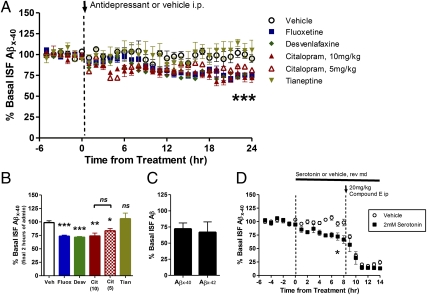Fig. 1.
SSRIs reduce ISF Aβ levels in vivo. Two- to 3-mo-old PS1APP hemizygous mice were administered vehicle (PBS) or one of several antidepressants by i.p. injection: fluoxetine 10 mg/kg, desvenlafaxine 30 mg/kg, citalopram 5 mg/kg and 10 mg/kg, tianeptine 20 mg/kg (n = 5–8 per group). (A) As assessed by in vivo microdialysis, SSRIs reduced ISF Aβx-40 levels significantly beginning between 10 and 14 h after administration. (B) Twenty-four hours after administration, fluoxetine and desvenlafaxine reduced Aβx-40 levels to 73.4 ± 2.0% (P < 0.0001; n = 6) and 71.6 ± 1.2% (P = 0.001; n = 6), respectively, compared with baseline levels in each mouse. Doses of 10 mg/kg and 5 mg/kg citalopram reduced ISF Aβx-40 to 74.0 ± 5.4% (P = 0.004; n = 8) and 83.5 ± 4.2% (P = 0.02; n = 6) of baseline levels, respectively. ISF Aβ levels did not change significantly in tianeptine and vehicle-treated mice (n = 5 per group). (C) PS1APP mice treated with 10 mg/kg citalopram had similar reductions in ISF Aβx-40 and Aβx-42 levels; 71.9 ± 9.4% and 66.7 ± 16.3% of baseline levels, respectively, by 24 h posttreatment (n = 5). (D) PS1APP mice were treated with vehicle (artificial CSF, aCSF) or 2 mM serotonin directly to the hippocampus by reverse microdialysis for 14 h. By 8 h of administration, serotonin reduced ISF Aβx-40 levels to 66.7 ± 7.2% of baseline (P = 0.003, n = 5 per group). After 8 h, mice were administered a γ-secretase inhibitor, Compound E (20 mg/kg i.p.) to assess Aβx-40 half-life. Data presented as mean ± SEM.

